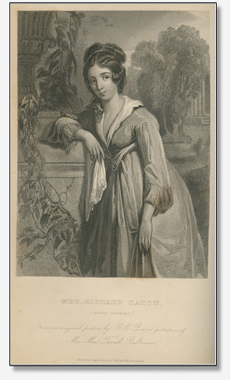
Rufus W. Griswold, The Republican Court, or, American Society in the Days of Washington. New and rev. ed. (New York, 1856), plate opposite 209. First ed., 1855.
POLLY CARROLL CATON (1770-1846) Mary (“Polly”) Carroll Caton was born on September 2, 1770, to Charles Carroll of Carrollton and Mary Darnall, and grew up in the Baltimore area in what was one of the most prominent American families of the era. Her father, who had signed the Declaration of Independence and served in the Continental Congress before becoming a Maryland state senator, was also one of the wealthiest men on the East Coast. It was through his influences that Polly became known in prestigious social circles; Carroll and George Washington were acquaintances who became close during the American Revolution. As her father’s eldest child (she had two siblings who lived past childhood: Charles, born in 1785; and Catherine (“Kitty”), born in 1789), Polly traveled with him on several business occasions. On one such trip, while in New York from March to April 1789, Polly mingled with elite politicians and their families, and quickly made a good impression. She became known for her “grace and amiable qualities,” as well as for her beauty, and was a “particular favorite” to George Washington himself.[1] A later account described her as “one of the most charming ornaments of the Republican Court.”[2] It is likely that the Carroll siblings were very well educated, as their father was reputedly a master of languages and law, and was a genuine bibliophile. Evidence shows that Polly had a certain amount of freedom to make her own decisions—at age 16, despite her father’s plan for her to marry a relative, she became engaged to a man named Richard Caton (1763-1845), a merchant recently arrived in Maryland. Charles Carroll of Carrollton wrote to Daniel Carroll, saying:
Polly’s father permitted the marriage on Caton’s word that he would free himself of all debt and establish himself in a business in which he could support a family. Soon enough, Caton had entered into a mercantile firm for cotton textile manufacturing[4]. In a mansion just west of Baltimore that had been a wedding gift from her father, Polly and Richard Caton would raise four daughters, all of whom were as well known as their mother for being societal “belles.” Polly and her siblings remained close to each other and to their parents for their lifetimes; her home was one of her father’s favorite places to visit during his long retirement. The town of Catonsville, Maryland, was named for the Catons’ estate, as the land around it opened for development. Written by Annie Turner. ______________________ [1] Rufus W. Griswold, The Republican Court, or, American Society in the Days of Washington (New York: D. Appleton and Company, 1867), 210. [2] “The American Graces,” Harper’s New Monthly Magazine 61, no. 9 (September 1880): 490. [3] Charles Carroll to Daniel Carroll, March 13, 1787, as quoted in Kate Mason Rowland, TheLife and Correspondence of Charles Carroll of Carrollton, 1737-1832 (New York: G. P. Putnam’s Sons, 1898), 2: 104. [4] George C. Keidel, “Catonsville Biographies: 1. Richard Caton of Catonsville,” Maryland Historical Magazine 16, no. 3 (September 1921): 304. |

